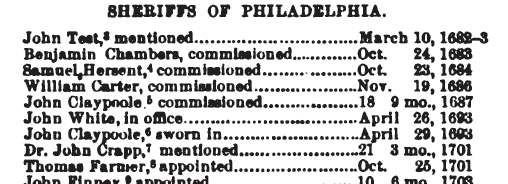The Case for John Test Still Serving as Sheriff and Prosecutor for the Philadelphia Witch Trial
There is some question whether or not John Test was still serving as sheriff at the time of this witch trial.
The trial occurred in the 12th month of 1683. Remember the Julian calendar is being used: the 12th month is February. John Test became sheriff the previous March. Although under British law, the first day of each new year was March 25, Quakers sometimes treated March 1st to be the first day of the year.
The Problem
In the list of Philadelphia sheriffs in Vol III of Scharf and Westcott’s History of Philadelphia 1609–1884 page 1737, Benjamin Chambers is listed as being commissioned sheriff on October 24, 1683. In the Julian Calendar, October is the 8th month.
If Benjamin Chambers was commissioned sheriff of Philadelphia in October 1683, John Test was not the sheriff in February of 1683 (the 12th month in the Julian Calendar) and therefore, he would not have served as the prosecutor in the witch trial.

Page 1737 of Scharf and Westcott, History of Philadelphia Vol III can be found here.
The complete volume can be found here.
The only evidence that Chambers was commissioned sheriff and commissioned on this date is one oddly constructed sentence in the colonial records of Oct, 24, 1683:
A warrt was Issued Out from this Board to Benjam. Chambers, High Sherriffs, to Sumons a Grand & Petty Jury for the Tryall of char. Pickering & Samll Buckley.
[Source: Minutes of the Provincial Council, Vo. 1, p. 30.
The full volume is here.]
The Case Against Benjamin Chambers Appointed Sheriff
The Record is Not Clear
In the above instructions to summon juries it might be that the plural of ‘High Sherriffs’ is a mistake. The record should read clearly and specifically:
A warrant was issued to Benjamin Chambers, (the) high sheriff, to summon a grand jury and a petit jury....
But obviously, the record does not say that Benjamin Chambers was the sheriff. It merely says that he was directed to summons a Jury. The dual commas create ambiguity.
I read the record as follows. To the south of Philadelphia lay the town of Chester that had its own sheriff or high sheriff. Bucks County, New Castle, Kent and Sussex Counties each had their own sheriffs. (See Minutes of Provincial Council.) Benjamin Chambers was the messenger. He was to deliver instructions to the sheriff of Philadelphia and to the other sheriffs – these high sheriffs were to summons a grand jury and a petit jury.
Penn's Frame of Government
That Chambers would become sheriff in October conflicts with Penn's instructions established under Article 17 of The Frame of Government of April 25, 1682, viz., that
...the General Assembly, shall, on the three and twentieth day of the second month, yearly, elect and present to the Governor, or his Deputy, a double number of persons to serve for sheriffs, justices of the peace, and coroners, for the year next ensuing, out of which respective elections and presentments the Governor, or his deputy, shall nominate and commissionate the proper number of each office the third day after the said presentments....
The Council records show that on the 10th of May 1684 [election] returns from Philadelphia, Chester, New Castle, Kent and Sussex were brought in by their respective sheriffs. I interpret this to mean that new council members and new sheriffs had been chosen. No mention is made in the record of the names of these new sheriffs.
I suggest that regular order was followed. The sheriffs were selected as Penn as prescribed in the Frame of Government. Philadelphia did not get a new sheriff in October of 1683.
May 1683 Reference to Benjamin Chambers
The name Benjamin Chambers appears in the records in May of 1683 with respect to complaints of disorder in taverns. Benjamin Chambers and Henry Lewis were appointed as “assistants to two Justices of the Peace, to see good Orders kept...(Col Records of Pa, Vol. 1, p. 18).”
This is a clear case of Benjamin Chambers performing in a law-enforcement capacity without holding the office of sheriff. Delivering a jury summons is a law-enforcement activity that can reasonably be carried out by a similar assistant. There is no solid evidence to support the claim that Chambers was ever appointed sheriff of Philadelphia.
November 1683 – John Test Served as Prosecutor in the Case of The Alexander of Inverness
It would be extremely odd if Chambers had become sheriff of Philadelphia in October of 1683. In the following month – November – John Test is called the prosecutor in the forfeiture trial concerning the ship the Alexander of Inverness.
During the colonial period sheriffs served not only as the chief arresting officer of their jurisdiction but also as the chief prosecutor. If John Test was the prosecutor in November then he was probably the sheriff of Philadelphia in November. Benjamin Chambers was not the sheriff and never was the sheriff of Philadelphia.
If we accept the issuance of a warrant to Benjamin Chambers in October as evidence that he was the sheriff, then we would be equally warranted in accepting the fact that John Test served as the prosecutor in a maritime case in November that John Test was the sheriff.
Samuel Horsent: Sheriff–Prosecutor in the Maritime Case of Harp of London
In the record for the 14th of October 1684 it is mentioned that Samuel Horsent was the prosecutor in case of The Ship called the Harp of London. Scharff and Westcott read this as the date that Horsent is commissioned as sheriff. I believe this is wrong. I believe he was commissioned as sheriff shortly after the May election returns were counted and that this is simply the first time his name is mentioned as being the sheriff–prosecutor for the city of Philadelphia.
It is odd that Scharff and Westcott would infer from the record that if Samuel Horsent was the prosecutor in a maritime case in October of 1684 that Horsent was the sheriff but not infer that if John Test was the prosecutor in a maritime case in November of 1683 that John Test was the sheriff.
If serving as the prosecutor is sufficient to infer that Samuel Horsent is the sheriff in October of 1684, then it is equally sufficient to warrant the inference that John Test was the sheriff when he served as prosecutor in a similar case in November of 1683.
Summary
1) The evidence that Benjamin Chambers became sheriff in October 1683 consists of one oddly constructed sentence mentioning the issuance of a warrant to him.
2) The evidence that John Test was still the sheriff for the witch trial of December 1683 rests on five facts:
a) That he was appointed sheriff in March of 1683.
b) That the term of office was one year and the elections were to held each April. In May 1684 the election results were presented to the Council.
c) We know that John Test was the prosecutor in a maritime case in November of 1683.
d) There is no evidence he failed to serve his entire term.
e) There is no evidence that anyone else was appointed sheriff.
I believe that given item 1 and items 2a–2e we warranted in inferring that John Test was still the sheriff in November of 1683 and the sheriff during the witch trial of December 1683.

